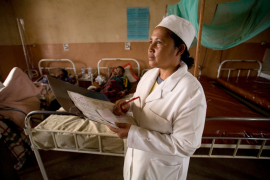The RBM Partnership to End Malaria is the global platform for coordinated action against malaria. It mobilizes for action and resources and forges consensus among partners. The Partnership is comprised of more than 500 partners, including malaria endemic countries, their bilateral and multilateral development partners, the private sector, nongovernmental and community-based organizations, foundations, and research and academic institutions. For more info check the RBM website: www.endmalaria.org.
Despite these gains, malaria still poses a significant threat to public health and sustainable development. WHO report indicates that in 2019, there were 87 countries and territories that reported a total of 229 million cases of malaria cases and 409 000 deaths. Worldwide, 11 countries - all but one in sub-Saharan Africa - carry 70% of the global malaria burden. At the same time, more countries than ever—46—are within reach of elimination.
RBM's Vision is of a world free from the burden of malaria.
During 2020, the RBM Partnership to End Malaria developed its 2021-2025 Strategy. The new Strategy Framework identifies three Strategic Objectives and four Strategic Enablers and specific related actions.
Between January and May 2021, the RBM Partnership to End Malaria needs to develop the implementation plan for the new Strategy, incorporating high-level performance indicators (KPIs) for approval by the Board in May 2021. The implementation Plan should consider the 2021 Workplan and Budget and comments provided by the RBM Partnership Board on its 16th Meeting.
The new Strategy Framework provides the basis in order to develop the implementation plan for the Partnership as a whole and not only for the Secretariat. The implementation plan must be developed for the complete duration of the new Strategy.
The grantee will lead and facilitate the overall process with the support of RBM Partnership Partners Committees and Secretariat, resulting in a concise Implementation Plan for RBM Board approval in May 2021.
The work shall be completed under the leadership of the RBM partnership CEO and in close collaboration with the RBM strategy task force team which includes members of the RBM secretariat, Partner Committee co-chairs and key malaria stakeholders.
Objectives of the Grant:
To translate RBM’s 2021-2025 Strategy Framework, its goals and objectives, into an actionable five-year Strategy Implementation Plan with measurable time bound targets, accountabilities and resource needs, both financial and human.
Under the leadership of the Chief Executive Officer, the Grantee will develop the Strategy Implementation Plan which will include addressing the following:
- Elaborate the activities that flow from the Strategic Objectives, related Actions and the Enablers. This will build on the strategy narrative that already provides some granularity on these
- Propose, where relevant, how the Partnership structures may need to be refined (if at all) to facilitate the delivery of the Strategy.
- Identify responsibilities across different arms of the Partnership; Secretariat, Partnership Committees, Working Groups and other partnership instruments.
- Prepare an accompanying prioritized budget for Partnership activities and for the Secretariat.
- Develop implementation milestones and KPIs to monitor and adjust implementation progress as needed
Key deliverables:
- For each of the three Strategic Objectives (SOs) (and accompanying 10 Strategic Actions) and the four Strategic Enablers, the implementation plan will need to articulate the following:
- defining the activities to deliver on the SOs and Enablers;
- establishing the timebound targets, by quarter for 2021; annually for 2022-2025;
- identifying responsibilities across PCs, Secretariat and other elements of the Partnership (Working Groups), as may be refined as a consequence of the implementation plan;
- propose an organizational structure for the secretariat that reflect the identified activities and responsibilities above
- Assigning priorities; to recognise resourcing constraints.
- Preparation of a financial budget – differentiating between Secretariat and non-Secretariat needs – and a corresponding human resource plan for Secretariat.
- Development of Key Performance Indicators (KPIs) that can support monitoring of progress across the duration of the strategy.
- Design process to enable RBM to take stock and review against changing context (particularly important for impact of COVID-19 by end of 2021) as well as a Mid-term Review (during 2023) so that modifications are captured as needed.
Role of the Grantee:
- Overall project management, coordination and routine check-ins with Secretariat Management
- Facilitating separate planning workshops with Secretariat and each of the PCs having previously prepared for this through work with the 3 x PC managers
- Develop the Implementation Plan with input from the Secretariat
- Prepare implementation plan budget with input from the Secretariat
- Identify and define the scope of activities, identify required resources and define the targets/KPIs with input from the Secretariat. For this, the Grantee will lead the process of working with the PC Chairs (and wider committees) together with the PC Managers to define and scope the activities for each SO and Enabler, identify required resources and define the targets/KPIs
- Develop a human resource plan with input from the Secretariat
- Prepare presentations and speaking points for 17th Board meeting (6-7 May 2021) and draft materials for Finance Committee Meeting in April 2021.
- Present finalized implementation plan and KPIs to the RBM Board and Management team
